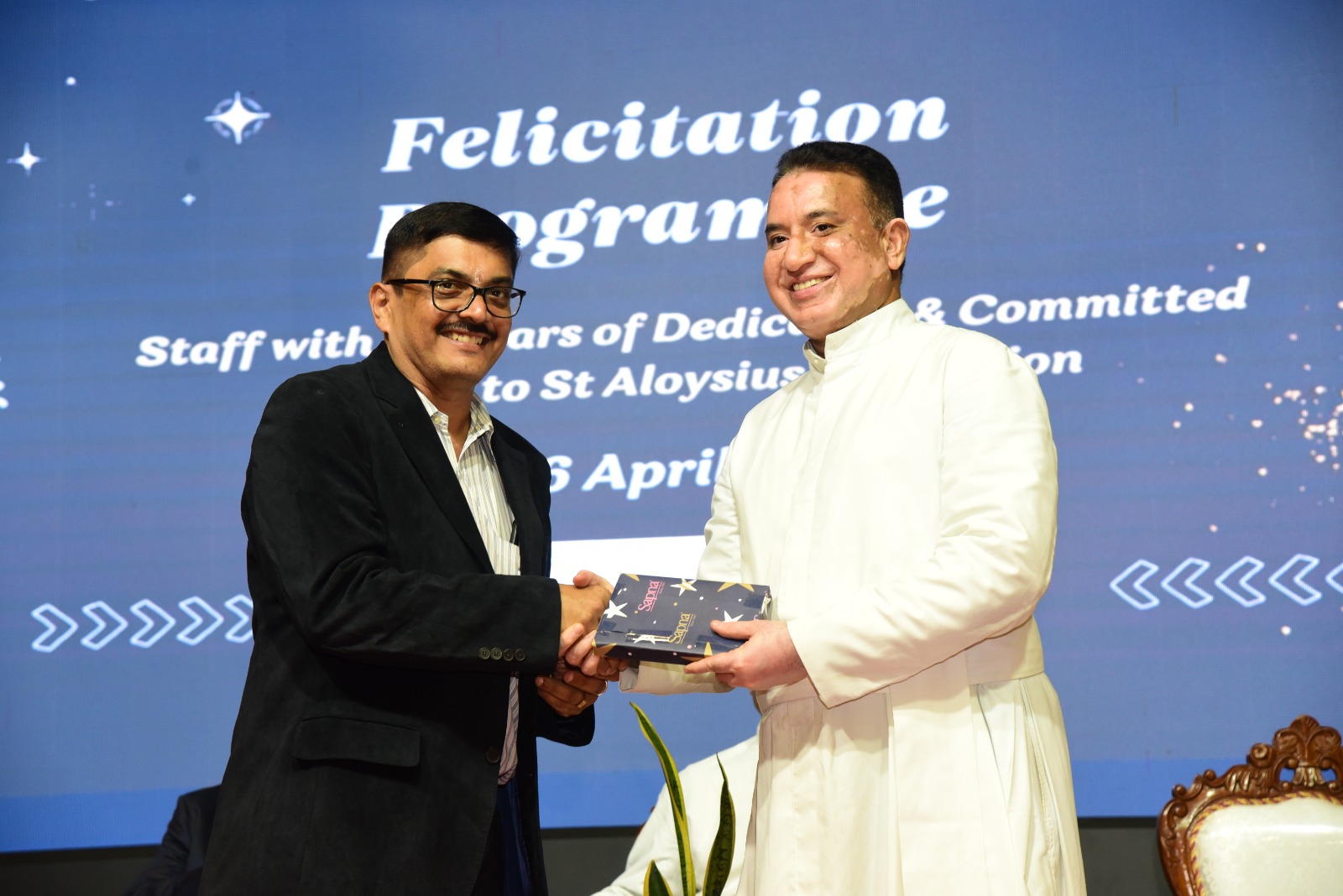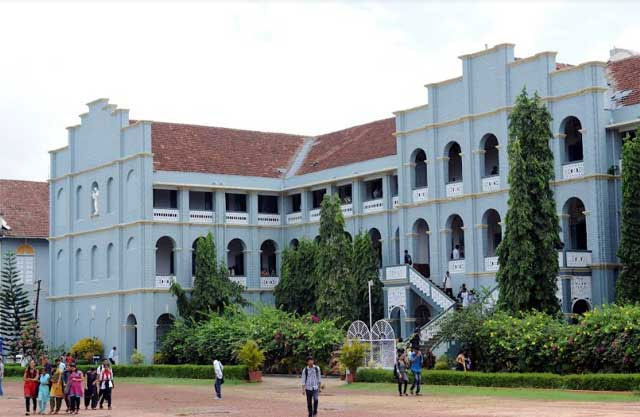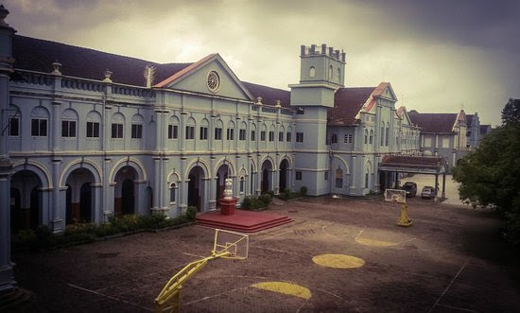Fr. Praveen Martis SJ, Vice Chancellor of St. Aloysius University has transformed challenges into opportunities for personal growth and institutional betterment | Global TV
NV Paulose, Chairman, Global TV +91 98441 82044
Fr. Praveen Martis SJ, Vice Chancellor of St. Aloysius University, is a man of profound humility and inspiring vision. Through his life journey, he has transformed challenges into opportunities for personal growth and institutional betterment. In an exclusive interview, Fr. Martis shared the turning points in his life, the success stories he cherishes, the challenges he overcame, and the lessons he holds dear. His reflections reveal a life dedicated to service, creativity, and transformation.
The Turning Points: Discovering a Path beyond Fear
Fr. Praveen Martis’ life journey began as a timid and introverted child, shaped by unique family dynamics and a love for reading. “I was a very quiet, introverted man,” he recalled, attributing this to the significant age gap between himself and his siblings. This solitude, however, became fertile ground for developing a deep habit of reading. His father, a social worker who brought home books from the library, inspired his intellectual pursuits.
Despite excelling academically, Fr. Praveen Martis faced a significant challenge beginning with stage fright and difficulty in interpersonal relationships. He feared public speaking and struggled with self-doubt, wondering what others would think if he made mistakes. “The fear of the stage was very frightening,” he admitted, adding that his perfectionist tendencies only heightened this anxiety.
The major turning point in my life came when I joined the Jesuit Order in 1991 after completing my PUC. This decision was monumental because, up until that point, I had been a timid and introverted person, struggling with interpersonal relationships and a deep fear of public speaking.
Growing up, I was the third child in a family where the age gap between my elder siblings and me was about seven years, and another seven years separated me from my younger brother. This significant age gap meant that I often played alone or with neighbouring children, but I largely grew up in solitude. This shaped my introverted personality.
Being an introvert, he could immerse himself in the habit of reading!

However, there was a silver lining: my father was an avid reader and often brought home books from the library; Reader’s Digest, National Geographic, and more. Observing his reading habits, I developed a love for reading as well. I read Kannada novels and other materials that came home, and this fostered a love for learning and a strong intellectual foundation. I even participated in quizzes and writing competitions, which I excelled at. But despite being a good student academically, I struggled with confidence in social and public settings.
The lack of interpersonal skills left me feeling inadequate at times. I admired my father, who was a great social worker and often helped people selflessly, and I dreamt of being like him. This dream inspired me to consider the priesthood as a way to serve others. However, my fear of public speaking and stage fright posed significant challenges. Even though I was academically sound, the thought of standing in front of people and addressing them terrified me. I would often question, “What if I make a mistake? What will people think of me?”
This internal conflict continued until I met a humble Jesuit priest who changed my perspective. He explained that priesthood did not necessarily mean being a parish priest standing in front of a congregation. In the Jesuit Order, there were opportunities to serve as a social worker, scientist, or educator. These were roles that did not require constant public appearances. His words opened my eyes to the variety of ways I could serve God and society while also addressing my fears.
Joining the Jesuit Order marked a transformative phase. I discovered myself and began to address my fears step by step. The Jesuit philosophy of small, incremental changes impressed me deeply. For instance, I tackled my fear of public speaking through gradual exposure rather than attempting to conquer it all at once. Over time, I not only overcame my fears but also developed a knack for creativity and problem-solving which had helped me so much even now.
A specific instance to highlight this ability is very interesting. There was an area where students would often loiter, and it was challenging to manage them. Instead of reprimanding them or imposing rules, I approached the situation creatively. I beautified the space by adding potted plants, making it inconvenient for students to sit there while simultaneously enhancing the environment. This small act of creativity solved a problem without confrontation and sparked a new way of thinking in me: solving issues through micro-changes.
This mind set of gradual improvement became a cornerstone of my approach to life. Inspired by the principles of “Atomic Habits,” I learned to focus on small, consistent changes rather than attempting drastic transformations. Over time, these micro-changes accumulated into significant shifts, both in my personal life and in the communities I served.
Another profound realization was the importance of empathy and prioritizing others’ needs like skipping meals or sacrificing comfort to address the needs of people who had travelled long distances seeking help. Their prayers and goodwill strengthened my resolve to continue serving selflessly. In retrospect, joining the Jesuit Order not only helped me overcome my limitations but also shaped my identity as a creative problem-solver and a compassionate listener.
It was indeed the most defining turning point in my life, transforming me from a timid, introverted boy into someone capable of making meaningful contributions to the world around me. The next major turning point happened in Delhi where I studied theology for four years. Usually we get an opportunity for two years. For our batch, because of some reason, we were in Delhi for all four years. I would say that was a major turning point in my life, Delhi being the capital city.
There were various opportunities to do service along with studies. The exposure that I got was tremendous. I got an opportunity to serve in the deepest slum and also in Tihar jail. I had heard about Tihar jail definitely, but I had no idea what the jails are, what really happens there. There was one priest who used to go and do counselling service there. So I pleaded him in the first year to join.
He said there is no vacancy. So many people would like to come. So maybe next year we will give you a vacancy if there is one. Second year I tried and I got. And then three years I went to Tihar jail to really serve the people, to counsel and learn terrific things. First of all, my whole idea of life changed because I am a son of a military man. I knew only discipline and I thought if I make a mistake, there is punishment. And the jail is the place where the severest punishment is given.
There is nothing called punishment in Jail; It is all about Reformation

When I went there, I realized there was no punishment there; only reformation. The whole idea of mine about jail changed. In fact, my idea about life itself had changed a lot with that. I thought life is only meant for punishment. That was my perspective about life being the son of a military man. Seeing the life in Tihar Jail was a paradigm shift, I would say in my approach towards and attitude of life.
Kiran Bedi and others where transforming people in the jail; they said it’s only reformation; and I said if that is reformation, what am I doing? What are our Christian institutions? Our schools were known for discipline and punishment if you don’t follow. Jails don’t give punishment. Why do we give punishment then? Is there a transformation possible? So my idea about transformation came then. That’s a major shift in my life. To look at a person from a transformative angle.
If I had never gone to Tihar jail to any jail, I would have never changed my perspective because that was the ultimate place of punishment I knew. Whole attitude of my life changed. Now, if at all it has affected my administration is that, you know, for three years I have gone to practically all jails, met so many people, conducted so many programs there and I learned how we can transform people. And after that, wherever I went, I went to Bangalore, I took my students there. Because I felt since, like me, many are ignorant; let the eyes get opened up!
When I came to Mangalore, I visited quite often to our place and we started two diploma courses from the college. One is on organic farming, another one. And they are trained by the institution. Thanks be to God, because of that, my way of looking at my life has changed. I am bringing that into my administration, to everyone, to my teachers, to my students, to transform, to inspire, to change, to reform their lives. When something happens, punishment is not the ultimate.
The Dignity Lesson from Belgium

The third turning point, I would say, when I went to Belgium, again, my life has been very graceful in the sense of luck or success. Yes. It is a chance or grace, I would say, being a priest, more than luck or chance. Because I was sent to Belgium for my, that too, science studies, to do my doctorate studies. I had no idea. That is the first time I was travelling by flight. Going abroad. Till then, I have not even travelled in domestic. I had no idea.
Traveling there, distant land, not knowing a single person, landing there. I thought it was English. Everybody speaks in that particular place, only French. So I had to then learn French. For me, like, you know, six months. I couldn’t even speak, or communicate with others. But I remained there to learn French.
There I learnt one important lesson of life. The dignity. Nobody criticized me. No one criticized me. In India, I would only, you know, get only criticism. People telling me this is not okay, that is not okay, this correction, that correction. I was not good in many things. Only appreciation. No corrections. Even when I was not able to do my work, my guide came and sat in front of me.
My guide comes and sits in my place and helps me. And says, no correction. Doesn’t call me to his office to correct me. I felt Jesus’ experience, first time in my life. Dignity for what I am without doing anything. Not based on what I am doing, but what I am as a person. First time as a child of God.
Nobody criticized me. In the workplace, only positive, positive, positive. Only appreciation. So that’s another change that happened. I brought that also into my administration. And because I was changed, I brought that change into my life.
Another turning point is where I learnt humiliation. The humility by humbling down when things don’t go well. I was principal at St. Joseph’s, Bangalore Some reason or the other, things didn’t go well for me. And I had to resign and come down to Mangalore. Being the principal of one of the major colleges. And coming down and being here to teach like ordinary person. Not even as a vice principal. Because I felt at one moment, I am not meant for administration and all that.
And then everybody was looking at me. Terrible humiliation. But then I could face that humiliation. Jesus, when I was doing my long retreat, I was praying for humiliation. Jesus, like you, let me also experience humiliation.
I got an opportunity to experience humiliation. Then again, God brought me back into principal position, now Vice Chancellor. By learning how to be humble was another major shift of transformation. When you are humble, you are grounded. When you are grounded, things go well. You become simple. So these three things, major things I learnt from that.
The Vision of Transformation: From College to University
One of his most ambitious undertakings was the transformation of the historic St. Aloysius into a university. This vision required relentless effort over seven years, involving more than seventy trips to Delhi and countless challenges. Despite the frequent setbacks and humiliations faced along the way, he remained steadfast, fuelled by hope and a belief in the institutions potential.
This journey was not just about achieving institutional recognition but also about embodying the transformative philosophy that he had embraced through his life experiences. To foster an environment of growth, learning, and perseverance, he worked tirelessly and uplifted the institution to greater heights.
Stories are at further length. This part of the story, we shall publish as a separate article later. Let us now make an attempt to sum up the learning from the success story of Rev. Fr. Dr. Praveen Martis SJ.
The Ripple Effect of Leadership and Inspiration

Fr. Praveen Martis SJ’s life and leadership embody the transformative power of creativity, empathy, and self-discovery. His insights about the role of a leader, teacher, and institution are profound and shaped by his own experiences of overcoming personal challenges and embracing change. As Vice Chancellor of St. Aloysius University, he has become a lighthouse of inspiration, demonstrating that leadership is not about titles or authority but about service, vision, and the ability to uplift others.
One of the key pillars of Fr. Praveen Martis’ leadership philosophy is the idea that leadership is not about commanding or exerting control. Instead, it is about embodying goodness and integrity. He often shares this message with young leaders, encouraging them to lead by example rather than through directive power. “You are leaders, and leaders should be good people,” he says
Fr. Praveen Martis believes that when leaders work with a clear conscience and pure intentions, they inspire those around them to do the same. Leadership, in his view, is a reflection of values. It is a force that not only drives organizational goals but also cultivates a culture of trust, respect, and collaboration.
Creating Spaces for Learning

Fr. Martis views the classroom and the learning environment as spaces for reflection, growth, and transformation. As an educator, he believes it is not enough to simply deliver knowledge. True education comes from creating an environment where learners are encouraged to think critically, reflect deeply, and grow in their understanding. He stresses that the educator’s role is not merely to instruct but to inspire and create spaces that allow learning to flourish.
In every meeting or conference he attends, Fr. Martis strives to build concepts incrementally, weaving them into a broader narrative that fosters intellectual growth. For him, the real transformation occurs not just within students, but also within those who guide them; the teachers. He recognizes that it is the educator’s mind-set and approach that play a crucial role in shaping the minds of the next generation.
The Teacher’s Role: The True Catalyst
One of the most significant insights Fr. Martis shares is his belief that the teacher is the true catalyst for change. In his experience, the struggles of students are often reflective of deeper issues within the teaching process itself. “The problem is rarely the student; it’s often the teacher,” he explains. This idea aligns with his broader vision of transformation; if teachers are inspired and engaged, the students will naturally follow suit.
He encourages teachers to become lifelong learners themselves, constantly seeking inspiration and growth. When educators are passionate and committed to their work, they become powerful agents of change. Fr. Martis’ own journey from overcoming personal fears to embracing creative problem-solving demonstrates the transformative potential of education when teachers are both inspired and inspiring.
A Vision for Change

For Fr. Martis, creating meaningful change begins with the educator. To facilitate this transformation, he believes it is essential to surround teachers with inspiration. Provide them with Faculty Development Programs and surround them with inspirations in the form of photographs of Nobel laureates, inspiring quotations, or stories of perseverance, teachers can be constantly reminded of the power of their role in shaping the future.
Fr. Martis’ own leadership at St. Aloysius University exemplifies his vision for change. The university’s transformation, particularly its elevation to university status, was not a solitary effort but a collective one, grounded in the values of perseverance, empathy, and incremental change. Through his leadership, the institution has become a place where students, teachers, and staff alike are empowered to think differently, to act with integrity, and to lead with compassion.
A Journey of Transformation
Fr. Praveen Martis SJ’s life journey talks about the transformative power of self-discovery, creativity, and leadership. From overcoming personal fears and insecurities to embracing new perspectives on life and education, his experiences have shaped him into a leader who is both visionary and compassionate. His commitment to service, creativity, and transformation has not only impacted the institutions he has served but has also inspired countless individuals to look within themselves and discover their own potential for growth and change.
True leadership is not about titles or power but about the ability to uplift others, to transform lives, and to inspire a better tomorrow.
His message is clear: leadership, at its core, is about being a good person, serving others selflessly, and creating spaces where everyone can thrive. Through his life and work, Fr. Praveen Martis SJ exemplifies the transformative power of education and leadership in creating a more compassionate and inclusive world.






One thought on “Fr. Praveen Martis SJ: A Journey of Self-Discovery, Creativity, and Leadership | Global TV”